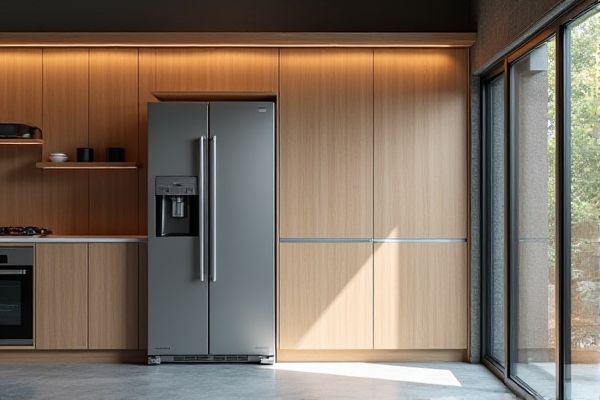
Garage refrigerators are specifically designed to operate efficiently in extreme temperature conditions, making them ideal for unheated or uncooled spaces, while regular refrigerators perform best within controlled indoor environments. Discover how choosing between a garage refrigerator and a regular refrigerator can impact your food storage and energy use by reading the rest of the article.
Table of Comparison
| Feature | Garage Refrigerator | Regular Refrigerator |
|---|---|---|
| Temperature Range | Wide range, works in unconditioned spaces (45degF to 110degF) | Optimal for indoor use (typically 35degF to 45degF) |
| Insulation | Enhanced insulation for extreme conditions | Standard insulation for indoor environments |
| Durability | Built to withstand dust, humidity, and temperature fluctuations | Designed for stable indoor environments |
| Energy Efficiency | May consume more energy due to wider temperature tolerance | Generally more energy-efficient in controlled environments |
| Price | Usually higher due to specialized features | Varies, often lower than garage models |
| Usage Location | Ideal for garages, unheated basements, outdoor kitchens | Best suited for kitchens and climate-controlled areas |
| Cooling Technology | Advanced compressors to handle temperature extremes | Standard compressors optimized for consistent indoor temps |
Introduction to Garage Refrigerators vs Regular Refrigerators
Garage refrigerators are specifically designed to operate efficiently in extreme temperature ranges, making them ideal for unheated spaces like garages. Unlike regular refrigerators, which maintain optimal performance in stable indoor environments, garage models feature enhanced insulation and more robust compressors to handle fluctuating temperatures. Your choice depends on where you plan to install the appliance and the surrounding temperature conditions.
Key Differences Between Garage and Regular Refrigerators
Garage refrigerators are specifically designed to operate efficiently in extreme temperature environments, maintaining consistent cooling in unheated spaces typically ranging from 40degF to 110degF. They feature robust insulation, heavy-duty compressors, and temperature-compensated thermostats to prevent freezing or overheating, unlike regular refrigerators optimized for stable indoor climate conditions around 68degF to 72degF. Regular refrigerators generally offer more advanced features such as precise temperature controls, humidity drawers, and aesthetic finishes suited for kitchen use, whereas garage models prioritize durability and temperature resilience.
Temperature Tolerance and Climate Adaptability
Garage refrigerators are specifically designed with enhanced temperature tolerance, enabling them to maintain optimal cooling performance in environments ranging from 40degF to 110degF, unlike regular refrigerators that typically operate efficiently between 50degF and 90degF. Their advanced climate adaptability includes insulated compressors and reinforced seals, which prevent temperature fluctuations and preserve food quality even in unconditioned spaces. This makes garage refrigerators ideal for garages or workshops subject to extreme heat or cold, where regular refrigerators might fail or experience damage.
Energy Efficiency and Power Consumption
Garage refrigerators are designed with enhanced insulation and specialized compressors to maintain consistent temperatures in variable conditions, resulting in higher energy efficiency compared to regular refrigerators. Regular refrigerators generally consume more power when operating in non-climate-controlled spaces due to their standard temperature regulation systems. Choosing a garage refrigerator can optimize your energy use and reduce power consumption in environments with fluctuating temperatures.
Storage Capacity and Interior Design
Garage refrigerators typically offer larger storage capacities designed to accommodate bulkier items and varying temperature conditions, making them ideal for storing beverages and overflow groceries. Their interior design often includes adjustable shelves and more robust insulation to maintain consistent cooling in fluctuating ambient temperatures. Regular refrigerators prioritize sleek interior layouts with specialized compartments for perishables, featuring adjustable shelves and humidity-controlled crispers optimized for everyday kitchen use.
Installation Locations and Space Requirements
Garage refrigerators are specifically designed to operate efficiently in unheated or variable temperature environments, making them ideal for installation in garages or basements where temperature fluctuations are common. Regular refrigerators require stable, indoor conditions and adequate ventilation space to prevent overheating, limiting their placement to kitchens or climate-controlled areas. Your choice depends on available space and installation location, with garage refrigerators offering more flexibility for cooler, less insulated areas.
Durability and Longevity in Harsh Environments
Garage refrigerators are specifically designed with enhanced insulation and robust compressors to withstand temperature fluctuations and humidity, ensuring durability in harsh environments. Regular refrigerators often struggle in unconditioned spaces, leading to shorter lifespans and increased maintenance due to components not built for extreme conditions. Investing in a garage refrigerator guarantees longer operational performance under challenging circumstances, offering reliable food preservation where regular units would fail.
Cost Comparison and Long-Term Value
Garage refrigerators typically cost less upfront than regular refrigerators, with prices ranging from $200 to $600 compared to $600 to $1,500 for standard models. Despite the lower initial cost, garage refrigerators are designed for variable temperatures and may consume more energy, impacting long-term utility expenses. Regular refrigerators offer better insulation and energy efficiency, resulting in lower electricity bills and enhanced durability, which contributes to greater long-term value for most households.
Best Use Cases for Garage and Regular Refrigerators
Garage refrigerators are ideal for extra storage of beverages, bulk groceries, and overflow items in spaces with variable temperatures. Regular refrigerators excel in maintaining consistent cool conditions for fresh produce, dairy, and perishables inside your kitchen. Your choice should depend on whether you need supplemental storage or primary food preservation with stable temperature control.
Choosing the Right Refrigerator for Your Needs
Garage refrigerators are specifically designed to operate efficiently in extreme temperatures, making them ideal for unheated or poorly insulated spaces, unlike regular refrigerators that perform best in stable indoor climates. Your choice should consider the ambient temperature range of the installation area, as garage refrigerators maintain consistent cooling in hot or cold conditions where standard models may fail. For optimal food preservation and energy efficiency, matching the refrigerator type to your environment ensures reliable performance and longevity.
 homyna.com
homyna.com